Search
Showing 10 of 1193 results for Value-priced treatments https://simplemedrx.top
-
Second round of German academic exchange funding programme launching in April
ENZ and the German Academic Exchange Service (DAAD) will launch the second round of the German academic exchange funding programme on 5 April after the programme’s successful first round.
Funding will be available to researchers at higher education institutions in Germany and New Zealand. ENZ will fund early-career academics from New Zealand universities and Te Pūkenga – New Zealand Institute of Skills and Technology to travel to Germany, specifically students who are close to completing their PhD and academics who completed their PhD in the last five years.
With the objective of growing the number of applications in 2023, ENZ has decided to move to a model of providing funding up to NZ$12,500 per year for up to two years, without the need for applicants to show any other sources of funding.
The German academic exchange programme is the result of the signing of a Programmes for Project-Related Personal Exchange (PPP) arrangement between ENZ and DAAD in November 2021 to strengthen academic relations between New Zealand and Germany and promote complementary research activities.
ENZ’s Market Development Manager – Europe, Adina Stoye, said the programme had done much to grow academic collaboration between New Zealand and Germany through the partnership with DAAD, which is the world’s largest funding organisation for the international exchange of students and researchers.
“We are pleased with the success of the first round of the programme and are looking forward to seeing more applications for the second round launching in April.
“As an incentive to encourage more participation, applicants are no longer required to show any other sources of funding,” Stoye said.
Ahead of the programme’s launch, ENZ has organised an online information session on Tuesday 4 April at 7pm NZT (9 am CEST).
For more information on New Zealand German academic exchange programme and to apply, please visit this link.
You can register to take part in the information session on 4 April here.
If you have any questions, please contact ENZ’s Market Development Manager – Europe, Adina Stoye on adina.stoye@enz.govt.nz.
-
Growing New Zealand’s education connections in the Middle East
ENZ participated in the re-opening ceremony and stressed the importance of education connections between New Zealand and Saudi Arabia to a 300-strong audience.
A rousing performance of ENZ’s waiata – Manapou ki te Ao – by Ngāti Koraha, a kapa haka group based in Dubai, supported the embassy’s re-opening ceremony.
The event took place in the same week that University of Otago alumna, Rayyanah Barnawi, made the news as she is set to be Saudi Arabia’s first woman astronaut in space when she travels to the International Space Station later this year.
The visit was a useful opportunity to engage on education with Saudi Arabian government officials and to discuss G2G opportunities with NZ Inc agencies in the wider Middle East region.
ENZ’s Senior Advisor for the Middle East, Bronwyn Shanks, said the visit has been valuable in the way it has helped ENZ to lay the groundwork for an education delegation to the Middle East, including Oman, the United Arab Emirates, and Saudi Arabia in May.
“We understand the significance of the Middle East region for our education sector, particularly Te Pūkenga, universities, English language schools and edtech companies.
“We’re building knowledge and connections on the ground that can help open doors for New Zealand education providers looking to grow their links in the region and look forward to supporting them with a high-level education delegation visit.”
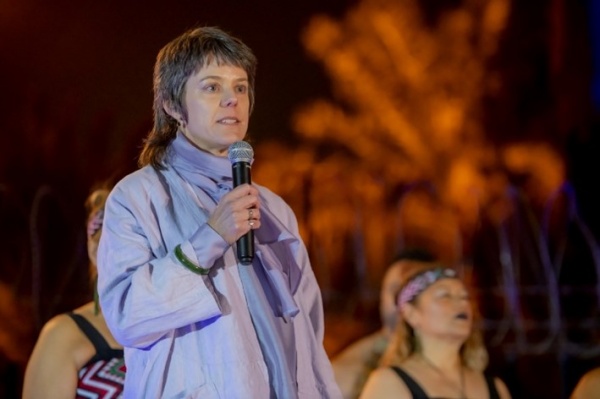
ENZ’s Bronwyn Shanks speaking at the New Zealand Embassy re-opening event, with Ngāti Koraha kapa haka group in support
Alongside the embassy’s re-opening event in Riyadh, ENZ and representatives from the University of Waikato and the University of Auckland met with Saudi government connections, including the National Institute for Educational Professional Development (NIEPD), Technical and Vocational Training Corporation (TVTC), Ministry of Culture, and Ministry of Tourism.
The discussions’ focus was on how New Zealand education providers could support Saudi Arabia’s efforts towards upskilling their young people under Vision 2030.
“It was great to meet some of those young alumni hosted by the University of Waikato and hear about the positive impact their New Zealand education experience continues to have now they are back in Saudi Arabia,” Shanks said.
ENZ and the University of Waikato also visited the University of Wollongong in Dubai, one of a network of study centres under university consortium NCUK, with which ENZ and all eight New Zealand universities have a partnership agreement to provide in-country foundation programmes.
Education providers interested in knowing more about education engagement in the region can contact ENZ’s Senior Advisor for the Middle East, Bronwyn Shanks, on bronwyn.shanks@enz.govt.nz.
-
First marae-led Prime Minister’s Scholarships for Asia recipients build indigenous connections in Japan
The first marae-led Prime Minister’s Scholarships for Asia recipients (members of Te Piruru Papakainga, Ngāti Maniapoto) visited Japan for a six-week visit that included a customised internship that connected them with indigenous Ainu organisations and villages in Hokkaido.
ENZ’s Manukura Chief Advisor Māori, Ed Tuari and Director of Education – Japan, Misa Kitaoka, welcomed the scholarship recipients in Tokyo in early January.
This is a great outcome for the Prime Minister’s Scholarship Programme, which has seen an increase in Māori participation. The latest round of applications for the scholarships saw an increase in Māori participation to 22 percent in 2022 from 5 percent from 2016 to 2019.
ENZ is eager to continue partnering with iwi, marae and whānau groups to raise Māori participation in the Prime Minister’s Scholarship programme, particularly in the current group round that opened for applications in March.
ENZ’s Manukura Chief Advisor Māori, Ed Tuari said it was a privilege to participate in what is an important milestone for building indigenous connections between Māori and the Ainu people of Japan.
“This is a significant achievement for ENZ Manapou ki te Ao. I want to acknowledge this collective achievement as we break new ground with this marae-led group of PMSA recipients.
“It’s hugely encouraging to see the increase of Māori participation in the latest round of the scholarships. This is a demonstration of ENZ ‘walking the talk’ to ensure Māori are better represented in opportunities to share and learn on the global stage, as well as promote indigenous to indigenous exchanges.”
ENZ’s Director Scholarships Carla Rey Vasquez said she was excited to see the growth and learnings that these programmes would bring to the wider whānau and iwi.
“Our scholarship recipients cherished the opportunity to connect with indigenous communities in Japan, and they particularly appreciated the value of reciprocity as well as the importance of generational knowledge being shared along.
“We look forward to continuing to raise Māori participation in the Prime Minister’s Scholarship programme.”
The latest visit by scholarship recipients has also been a good opportunity to enrich the existing education connections between New Zealand and Japan under a Memorandum of Understanding between New Zealand and the Hokkaido Government, which was renewed in 2022.
The customised internship that saw scholarship recipients visit Ainu villages and organisations, was organised by the Hokkaido Government and the Hokkaido Board of Education.
ENZ’s Director of Education – Japan, Misa Kitaoka, said the visit by scholarship recipients was timely as Japan starts to promote Ainu history, language and culture.
“The Ainu people received official recognition as ‘indigenous people of northern Japan’ from the Japanese government in 2019. As the government begins to promote Ainu history, language, and culture in Japan, Ngāti Maniapoto’s visit to Hokkaido was timely and appreciated by the Ainu community to learn about how New Zealand society has embraced Māori language and culture.”
Applications are open for the 2023 group round of the Prime Minister’s Scholarships for Asia and Latin America until 23 April 2023. More information on applications is available on ENZ's dedicated scholarship website here.
[updated 18 April 2023]
-
NauMai NZ and the NauMai NZ WeChat mini programme
‘Nau mai’ is a te reo Māori phrase of invitation and welcome and NauMai NZ is the NZ government's official student experience platform, designed to support international students living and studying in Aotearoa New Zealand
NauMai NZ is written in plain English and provides practical, trusted, peer-reviewed content, designed to support and improve students’ living and study experiences. This includes information and resources to support students before arriving in Aotearoa (including useful tips on moving to New Zealand and what they need to bring), though to information to help them navigate daily life once here, including on:
- Making friends and building social connections
- Exploring and experiencing Aotearoa – the culture and the country
- Getting advice to improve wellbeing, study and living experiences
- Managing money, finding accommodation, and understanding healthcare in New Zealand
- Balancing work and study and understanding workplace culture, and much more.
You can explore more via this link.
ENZ has also developed the NauMai NZ WeChat Mini Programme. This is a companion platform to the English platform, to better support Chinese students who prefer the WeChat ecosystem. Information from the English platform is available in Chinese on the mini programme, as well as specific features that provide peer-to-peer support, such as video sharing, livestreams, forum functionality and student stories.
The following QR codes can be shared with your international students. Printed flyers are also available and so if you would like these sent to you, or have any questions for our Student Experience team, please do not hesitate to contact Faymie Li, faymie.li@enz.govt.nz, and Ross Crosson, ross.crosson@enz.govt.nz.
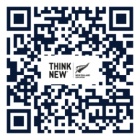

Manaakitanga is at the heart of what we all do, and ENZ aims to support you and your mahi. He waka eke noa. We are all in this together.
-
ISANA - Enhancing international student experiences
The ISANA New Zealand Annual Conference held at AUT University in Tāmaki Makaurau last month provided the perfect forum to address the challenges of strengthening capability and ensuring sustainability as the sector addresses ways in which to grow international education.
A key feature of the conference was the presentation of a new online ‘Capability Toolkit’ - a collaboration between ISANA NZ and Education New Zealand Manapou ki te Ao (ENZ). Developed as a resource for education practitioners, the toolkit presents strategies, tools, tips, guidelines, case studies, scenarios and more to assist with every facet of engagement with international learners.
ENZ’s General Manager Sector Services, Sahinde Pala, said that the conference provided a great opportunity to reconnect face-to-face with professional colleagues.
“We all enjoyed the opportunity to exchange experiences and hear from frontline practitioners how the rebuild of the sector is going from their perspective. It was a great opportunity to connect with those relatively new to the sector and let them know the role of ENZ and the resources available to assist them in their role.”
“It was also encouraging to see our industry coming together to collectively focus on improving our services for students. The Capability Toolkit is an important, practical resource that will assist education practitioners provide even better support for our international learners.”
The Capability Toolkit provides links to resources in the following areas:
- Wraparound tailored support for international students
- Critical incident management for international students
- Innovative leadership in international education
- Intercultural competence in educational contexts
- Student experience information for agents.
ENZ is continuing to work with ISANA to further develop the Capability Toolkit and other content will be added over time. In the meantime, anyone who has not had a chance to look at the toolkit, can explore this further on ISANA NZ’s website here.
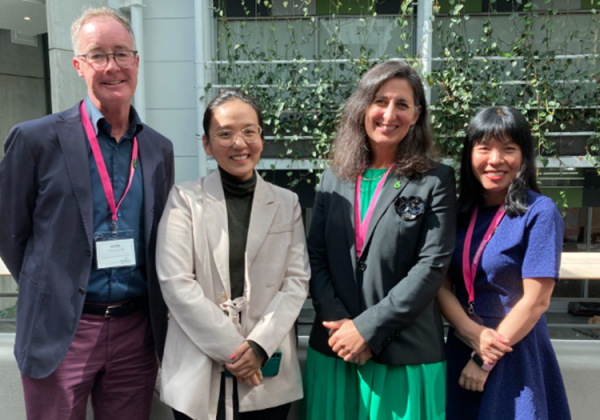
Vaelyn L, International Student Representative (second from left) with ENZ representatives at the ISANA conference Ross Crosson, Student Experience Manager, Sahinde Pala, General Manager Sector Services, and Faymie Li, Senior Advisor Student Experience
-
May update from Immigration New Zealand
Update on Student visa processing*
Since New Zealand’s international borders reopened in August 2022, Immigration New Zealand (INZ) has received 35,069 student visa applications from international students outside of New Zealand. We have completed 30,936 of these applications.
Our recent processing times for international student visa applications are published on our website. These are updated each month: Visa processing times for international students | Immigration New Zealand
*Figures current as at 10pm on 8 May 2023.
Visitor visas and short-term study
A holder of a visitor visa is permitted to attend a programme or programmes of study which are not more than a total of 3 calendar months in duration per 12-month period.
Recently we have received several queries regarding students intending to undertake a programme of study of more than 3 months duration (for example, a diploma) who wish to begin their studies while holding a visitor visa. This is not permitted as the intended programme is more than 3 months duration. Students must hold a student visa for the full duration of their intended programme of study (or hold an interim visa with open study conditions) if the programme of study is longer than 3 months duration.
Tuition fees
We would like to remind you that changes to the requirements for tuition fee payment evidence for students were introduced last year as part of the Immigration Rebalance.
Students need to pay tuition fees for the first year, or first programme of study (whichever is the shorter), and they will have to prove personal/maintenance funds for the same period. We do not accept payment of tuition fees by instalment; the only exception is for some aviation students.
-
Step up to the World, Tū māia ki te ao, a forum on global citizenship education, 11-13 September
Educators, those who work in education or anyone with a keen interest in growing their understanding of Global Citizenship Education are invited to attend this free forum. The forum aims to bring individuals and organisations together and share some of the wonderful work being done in the education sector while also looking at how we can collaborate and champion each other's workstreams in the future.
The forum will also support participants to:
- Understand Global Citizenship Education (GCED)
- Explore ways to honour our commitment to Te Tiriti o Waitangi through GCED
- Make links between key frameworks and strategies and the New Zealand context
- Explore the role of GCED in Asia-Pacific contexts and in international education
- Connect and share best practice with local and international experts and practitioners
You can register your interest for the event via this form here: https://forms.gle/NiBTqGxAzt9P2VrY8 or by sending an email to: tyler.tekiri@enz.govt.nz
-
The new Study with New Zealand study matching tool is now live
Education New Zealand Manapou ki te Ao (ENZ) has launched this revamped study matching tool on the SwNZ website to replace the previous MyStudyNZ tool. It is a useful tool for Aotearoa New Zealand's education providers to be able to promote their courses to students online.
Geoff Bilbrough, ENZ’s General Manager of Marketing said that with the launch of the new StudywithNewZealand website, it was important to continue with the study matching tool as feedback from the sector had indicated it was a valuable tool for providers to connect with potential students and make them aware of the courses they offered.
"The sector told us that the previous matching tool, MyStudyNZ, had been positively received and tended to generate leads that were more engaged.
“We believe this new tool will continue to provide significant benefits to education providers and prospective students as it guides international students to study options that match their personal interests and past qualifications.
“To get the most out of the new tool, it is important that education providers’ profiles and course listings on the SwNZ site are up to date and accurate. This will help present your institution and your courses to the right students”, he added.
While ENZ does carry out a major data upgrade for all institutions twice a year (via our partner IDP), now is a good time to check your information is displaying accurately on our Study with New Zealand website. Education providers will have recently received an email with information on how to do this. It is a very straightforward process, and ENZ encourages providers to check their profiles and ensure that the name of your institution or school is correct and that your profile makes the most of all the features the system offers. Make sure your keywords are relevant and your profile includes full descriptions and photos to help you stand out to potential students.
Tertiary providers are being asked to check course study mode, start dates, costs, venue, and the duration as this information is used in the new study matching tool and the SwNZ search tool. The link to the admin platform to be able to check these details is available here: www.idp-connect.com/sign-in
If you did not receive this email, do not currently have access to the admin platform, or have any questions about the tool, you can email: info@studywithnewzealand.govt.nz.
A how to guide for tertiary providers has been developed and is available here.
-
July update from Immigration New Zealand
Visa processing update (to 11 July 2023)
Since New Zealand’s international borders reopened in August 2022, Immigration New Zealand (INZ) has received 43,541 student visa applications from international students outside of New Zealand. We have completed 37,916 of these applications with 32,457 approved.
Our recent processing times for international student visa applications are published on our website. These are updated by month: Visa processing times for international students
Apply early
Unfortunately we have received many applications submitted only a few weeks before the student intends to commence study in New Zealand.
Students should apply for their visas around four months ahead of intended travel, and at least two months ahead of intended travel. We cannot prioritise late applications ahead of students who have applied in good time. Unfortunately, some students who apply late may miss their start date.
Please remember that students should not confirm travel bookings until the visa is granted.
-
New Zealand education in focus during Prime Minister’s trip to China
Education elements featured strongly in the Prime Minister’s Trade Delegation to China helping raise the visibility of New Zealand as an education destination for Chinese students.
To launch the trip, the delegation joined the Prime Minister at a Showcasing New Zealand event held at the New Zealand Embassy in Beijing to promote New Zealand as a travel and study destination. ENZ invited key media, influencers, and Chinese and New Zealand students to interact with the Prime Minister. This sparked significant local news coverage, amongst leading Chinese state media, setting the tone for the visit and highlighting the significance of international student exchanges between New Zealand and China. New Chinese media outlets also were seen covering New Zealand education as a topic for the first time.
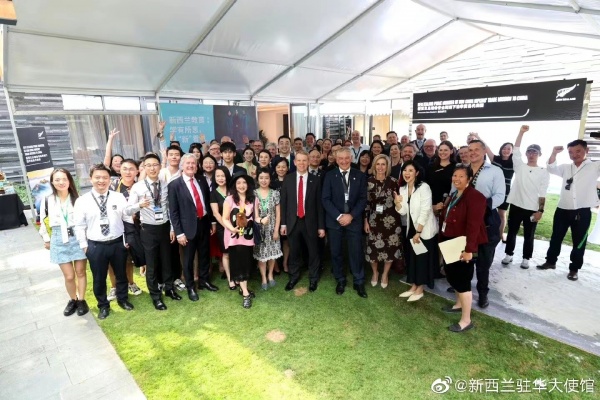
Group photo at Showcasing New Zealand event! (It was a kiwi bbq)
The Prime Minister also gave an address at Peking University to students, media, and the New Zealand delegation. To read the full speech, please visit the Beehive website.
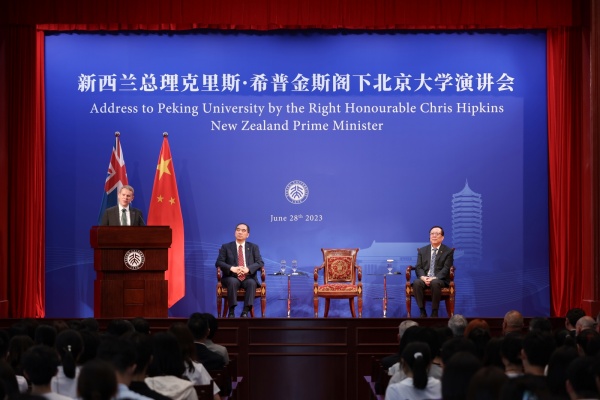
Peking University is host to the New Zealand Centre. Established in 2007 as a collaborative project between Peking University and the University of Auckland, the New Zealand Centre at Peking University has grown to represent all eight of New Zealand’s universities and enable high-level engagement across a range of departments and faculties. During the visit to the University on 28 June, the Prime Minister, with Hao Ping, Chair of Peking University Council and Gong Qihuang, President of Peking University, the Ambassadors of New Zealand and China, and representatives of the New Zealand Centre launched the Rewi Alley Professorship.
There were also other several significant developments in our bilateral education links with China that were achieved while there. These included:
- Signing of the Arrangement on Mutual Recognition of Academic Qualifications in Higher Education between the Ministries of Education witnessed by Prime Minister Rt Hon Chris Hipkins and Premier Li.
- Signing of a Strategic Partnership between Education New Zealand and Air New Zealand to support international education mobility and joint promotion in China. To read more, please visit the article on ENZ Collaboration with NZ Inc Agencies in China.
- The education delegation meeting with the Vice-Minister of Education Chen Jie (responsible for international cooperation) and China Ministry of Education officials. The meeting underscored the importance of a strong government-to-government relationship and provided a chance to showcase the education sectors present within the New Zealand delegation and discuss areas of existing and potential cooperation.
- A Sustainability Roundtable with a focus on education involving the education sector delegation and Chinese education partners.
It was a busy, challenging, insightful and ultimately very rewarding week. The education delegates also shared their own feedback. John van der Zwan, Executive Director Schools International Education Business Association reflected that the mission to China was hugely valuable and a chance to get high level insights into working with Chinese officials and agents following the pandemic.
“The mission was also a special opportunity to engage with the Prime Minister and other government officials on the role and importance of international education for our school sector,” he said.
Executive Director of English New Zealand, Kim Renner, noticed the shift in how New Zealand is profiled in China compared to many years ago and echoed the response from other delegates that the visit was valuable for the representatives of the education sectors.
“China is a development market for most of our members, so it was a great opportunity for English language to be part of this important delegation, particularly the meetings with the Vice Minister of Education and JJL Overseas Education Agency.”
“While seeing the country is a key part of study travel, we know that inbound students also want an immersive experience focused on people, cultural exchange and making connections. This was certainly showcased during the visit and was received very positively by all those we engaged with”, added.
ENZ would like to offer its sincere thanks and congratulation to everyone who was involved in the preparation and planning for the visit and gives special recognition to the education sector representatives on the Prime Minister Trade Delegation.
- Signing of the Arrangement on Mutual Recognition of Academic Qualifications in Higher Education between the Ministries of Education witnessed by Prime Minister Rt Hon Chris Hipkins and Premier Li.

